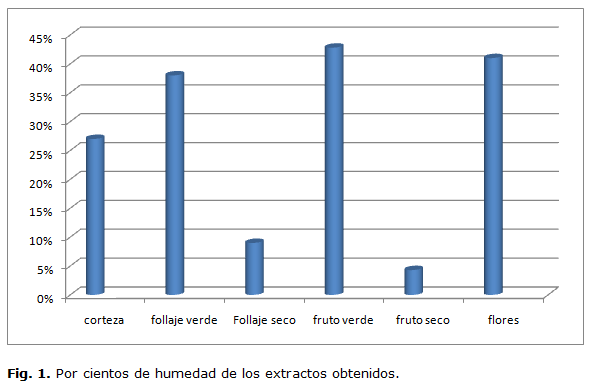Phytochemical study of the Cuban carob Samanea Saman for determining its potential from the point of view agroforest
Main Article Content
Abstract
The province of Pinar del Rio is the largest forest area in the nation and this has made investigations related to forest issues in this university has a high priority. Therefore a comprehensive phytochemical study of Samanea saman (carob (performed - (leaves, bark, flowers and fruits) to determine the presence of secondary metabolites and evaluate their potential. work phytochemical screening, historical and logical analysis, the study of documents, observation and collection of samples is used. Among the main results of the study of the various extracts showed the presence of substances such as amino acids, alkaloids, reducing carbohydrates, tannins, saponins and mucilage.
Downloads
Article Details
References
ANANTASOOK, N. y WANAPAT M. Influence of Rain Tree Pod Meal Supplementation on Rice Straw Based Diets Using In vitro Gas Fermentation Technique. Asian-Australasian Journal of Animal Sciences (AJAS) [En línea]. 2012, 25 (3). 325-334. ISSN: 1976-5517. DOI: https://doi.org/10.5713/ajas.2011.11131. Disponible en: http://www.ajas.info/journal/view.php?viewtype=cited&number=22687
BABAYEMI, O.J; INYANG, U.A; IFUT O.J y ISAAC, L.J. Nutritional Value of Cassava Wastes Ensiled with Albizia saman Pod as Feed for Ruminants in Off Season. Agricultural Journal [En línea]. 2010, 5(3). 220-224. ISSN: 1816-9155. Disponible en: http://docsdrive.com/pdfs/medwelljournals/aj/2010/220-224.pdf
CECEONELLO, G., BENEZRA, M. y OVISPO, N.E. Composición química y degradabilidad ruminal de los frutos de algunas especies forrajeras leñosas de un bosque seco tropical. Zootecnia Tropical [En línea]. 2003, 21(2). 149-165. ISSN: 0798-7269. Disponible en: https://www.researchgate.net/profile/Nestor_Obispo/publication/43564276_Chemical_composition_and_ruminal_degradability_of_some_woody_legumes_fruits_of_the_tropical_dry_forest/links/53e5018a0cf2fb748711258d.pdf
CONKLIN, N.L.; MCDOWELL, R.E. y VAN SOEST, P.J. Ranking twenty-two tropical browse species from Guanacaste, Costa Rica. TURRIALBA: Revista Interamericana de Ciencias Agrícolas [En línea], 1991, octubre-diciembre, 41(4). 615-450. ISSN: 0041-4360. Disponible en: https://books.google.com.cu/books?hl=en&lr=&id=V5pCjFOvwQkC&oi=fnd&pg=PA615&dq=Ranking+twenty-two+tropical+browse+species+from+Guanacaste,+Costa+Rica.&ots=-VlsmPZeoY&sig=oHx910-AxqRiEXRL03rLyRnM418&redir_esc=y#v=onepage&q=Ranking%20twenty-two%20tropical%20browse%20species%20from%20Guanacaste%2C%20Costa%20Rica.&f=false
CHICCO, C. F.; GARBATI, S.T. y HULLER, H.B. Una nota sobre el uso del fruto del samán (Pithecolobium saman) en la alimentación del cerdo. Agronomía Tropical, 1973, 23(3). 263-267.
CHUMPAWADEE, S., y PIMPA, O. Effect of Fodder Tree as Fiber Sources in Total Mixed Ration on Feed Intake, Nutrient igestibility, Chewing Behavior and Ruminal Fermentation in Beef Cattle. Journal of Animal and Veterinary Advances. 2009, 8(7). 1279.
DELGADO, D.C.; BELTRÁN, J.; HERAS, R.; CAIRO, J. y HORTA, Y. Samanea saman, a multi-purpose tree with potentialities as alternative feed for animals of productive interest. Cuban Journal of Agricultural [En línea]. 2014, 48(3). 205-212. ISSN: 2079-3480. Disponible: http://cjascience.com/index.php/CJAS/article/view/573
DELGADO, D. C., GONZÁLEZ, R., GALINDO, J., CAIRO, J., & ALMEIDA, M. Potential of Trichantera gigantea and Morus alba to reduce in vitro rumen methane production. Cuban Journal of Agricultural Science, 2007. 41(4), 319-322.
DELGADO, D.C.; LA O, O. y CHONGO, B. Bromatological composition and in situ ruminaldegradabilityof tropical legumes with perspectives of usein cattle productive systems. Cuban Journal of Agricultural Science, 41(4), 323-326.
DELGADO, D.C.; LA O, O. y SANTOS, Y. Cinética de la degradación ruminal in situ de cuatro árboles tropicales: Leucaena leucocephala, Enterolobium cyclocarpum, Sapindus saponaria y Gliricidia sepium. Revista Cubana Ciencias Agrícolas [En linea]. 2001, 35(2). 142-145. ISSN: 0034-7485. Disponible en: http://www.redalyc.org/articulo.oa?id=193018220008
DURR, P. A. The biology, ecology and agroforestry potential of the raintree, Samanea saman (Jacq.) Merr. Agroforestry Systems [En línea]. 2001, marzo, 51(3). 223-237. ISSN: 1572-9680. Disponible en: http://link.springer.com/article/10.1023/A:1010765022497
ELEVITCHSATTER, R. L. et al. The effects of blue and far red light on rhythmic leaflet movementsin Samanea (saman) and Albizzia (julibrissin). Plant Physiology [En línea]. 1981, mayo, 67(5). 965- 968. ISSN: 1532-2548. doi: http://dx.doi.org/10.1104/pp.67.5.965. Disponible en: http://www.plantphysiol.org/content/67/5/965.short
FERDOUS, A.; IMAM, M. Z. y AHMED, T. Antioxidant, Antimicrobial and Cytotoxic Activities of Samanea saman (Jacq.) Merr. Stamford Journal of Pharmaceutical Sciences [En línea]. 2010, 3(1). 11-17. ISSN 1999-7108. DOI: 10.3329/sjps.v3i1.6792. Disponible en: http://www.banglajol.info/index.php/SJPS/article/view/6792
GARCÍA, D.E. et al. Composición proximal, niveles de metabolitos secundarios y valor nutritivo del follaje de algunos árboles forrajeros tropicales. Archivos de Zootecnia Tropical [En linea]. 2006, 55(212). 373-384. ISSN 0004-0592. Disponible en: https://dialnet.unirioja.es/servlet/articulo?codigo=2253493
GARCÍA D. E. y MEDINA, M.G. Composición química, metabolitos secundarios, valor nutritivo y aceptabilidad relativa de diez árboles forrajeros. Zootecnia Tropical [En línea]. 2006, 24(3). ISSN: 0798-7269. Disponible en: http://avpa.ula.ve/rev_zoot/vol24_num3_2006/articulos/garcia_e.htm
GARCÍA, D. E. et al. Preferencia de vacunos por el follaje de doce especies con potencial para sistemas agrosilvopastoriles en el Estado Trujillo, Venezuela. Pastos y Forrajes [En linea]. 2008, julio-septiembre, 31(1). ISSN 0864-0394. Disponible en: http://scielo.sld.cu/scielo.php?script=sci_arttext&pid=S0864-03942008000300006
QUANSAH, E. S., Y MAKKAR, P. S. Use of lesser-known plants and plant parts as animal feed resources in tropical regions. FAO. Animal Production and Health Working Paper, 2012, (8), 1-32.
ROCK, J. F. Leguminous trees of Hawaii. Honolulu: Hawaiian Sugar Planters’ Association Experiment Station, 1920.
SATTER, R.L. et al. The effects of blue and far red light on rhythmic leaflet movements in Samanea (saman) and Albizzia (julibrissin). Plant Physiology [En línea]. 1981, mayo, 67(5). 965-968. ISSN: 1532-2548. doi: http://dx.doi.org/10.1104/pp.67. Disponible en: http://www.plantphysiol.org/content/67/5/965.short
SCHMIDT, D. Communication personal. Berkeley, CA: Pacific Southwest Forest and Range Experiment Station, 2008.
VALENTIM, J.F.; CARNEIRO, J. y VAZ, F.A. Growth of tropical forage grasses and legumes under shade. Pesquisa Agropecuaria Brasileira [En línea]. 2004. Marzo, 39(3). ISSN 0100-204X. Disponible en: http://www.scielo.br/scielo.php?pid=S0100-204X2004000300009&script=sci_arttext


